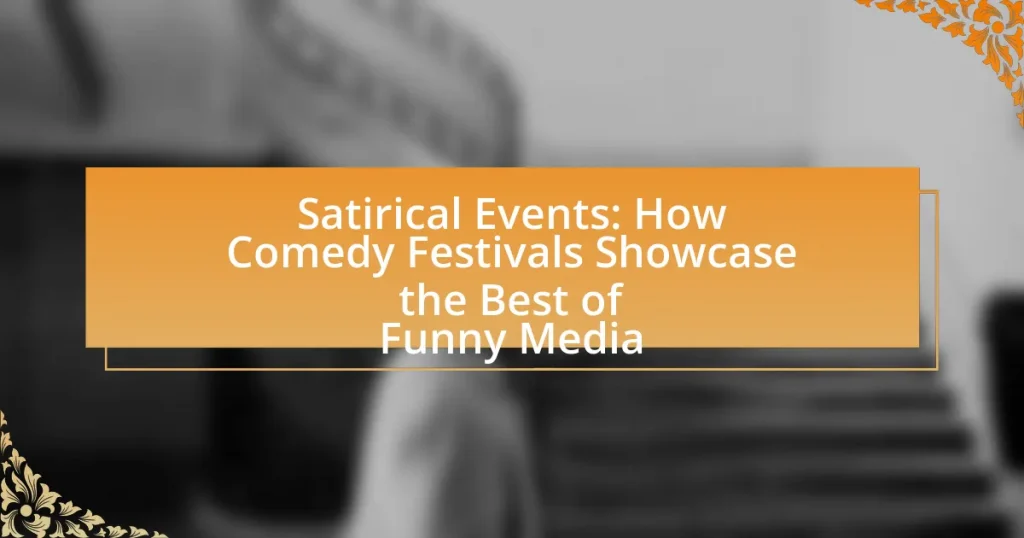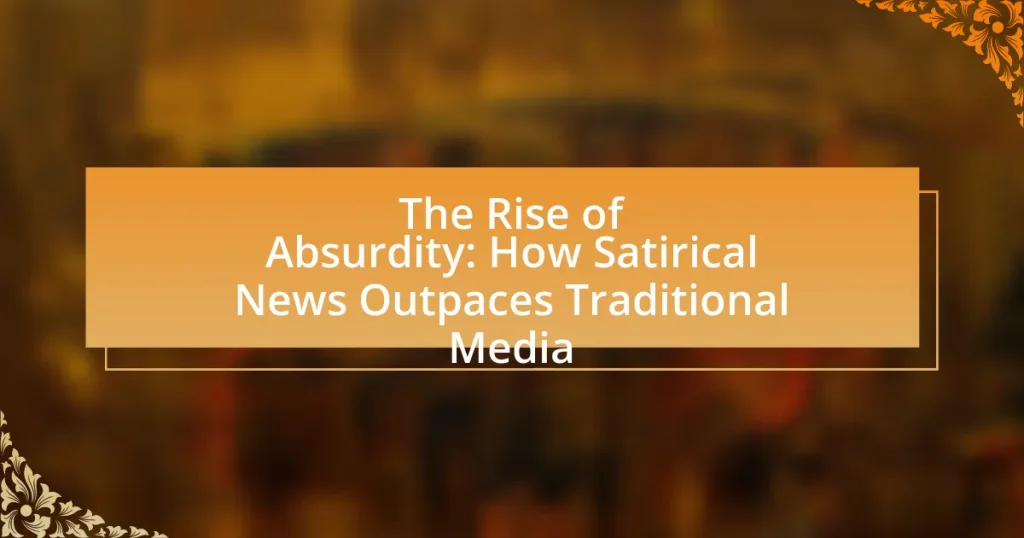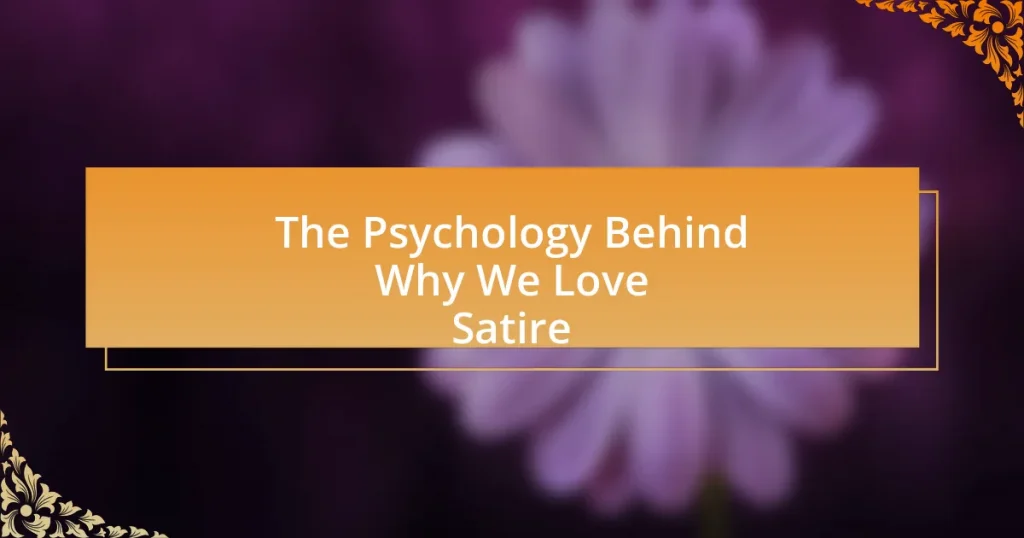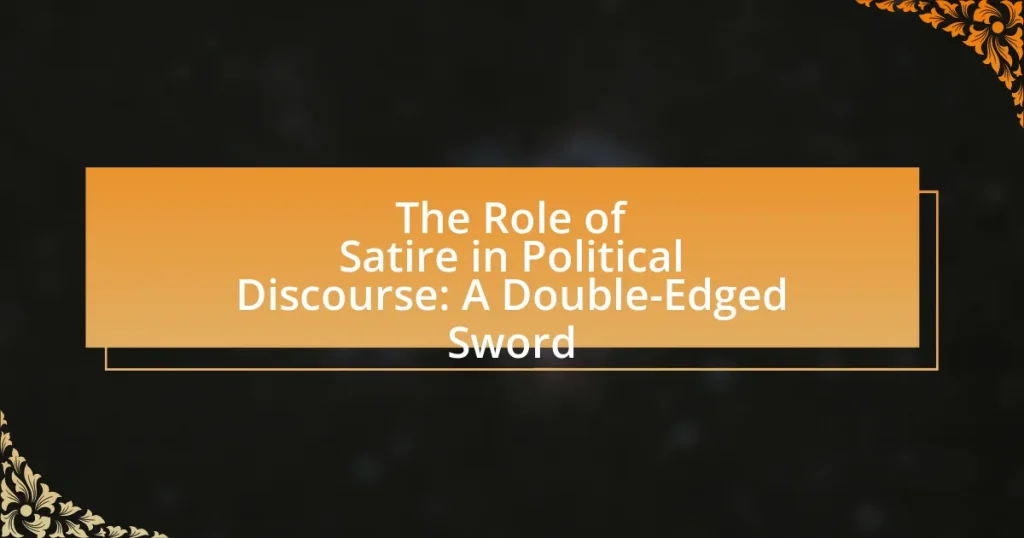Satirical events and comedy festivals are gatherings that utilize humor and satire to critique societal norms, politics, and culture. These festivals, such as the Edinburgh Festival Fringe, provide a platform for comedians to showcase diverse comedic styles while addressing contemporary issues. The article explores the differences between satirical events and traditional comedy shows, the elements that define satirical performances, and the importance of comedy festivals in promoting emerging talent and fostering community engagement. Additionally, it discusses the economic impacts of these festivals on local communities and the future trends shaping the landscape of comedy.
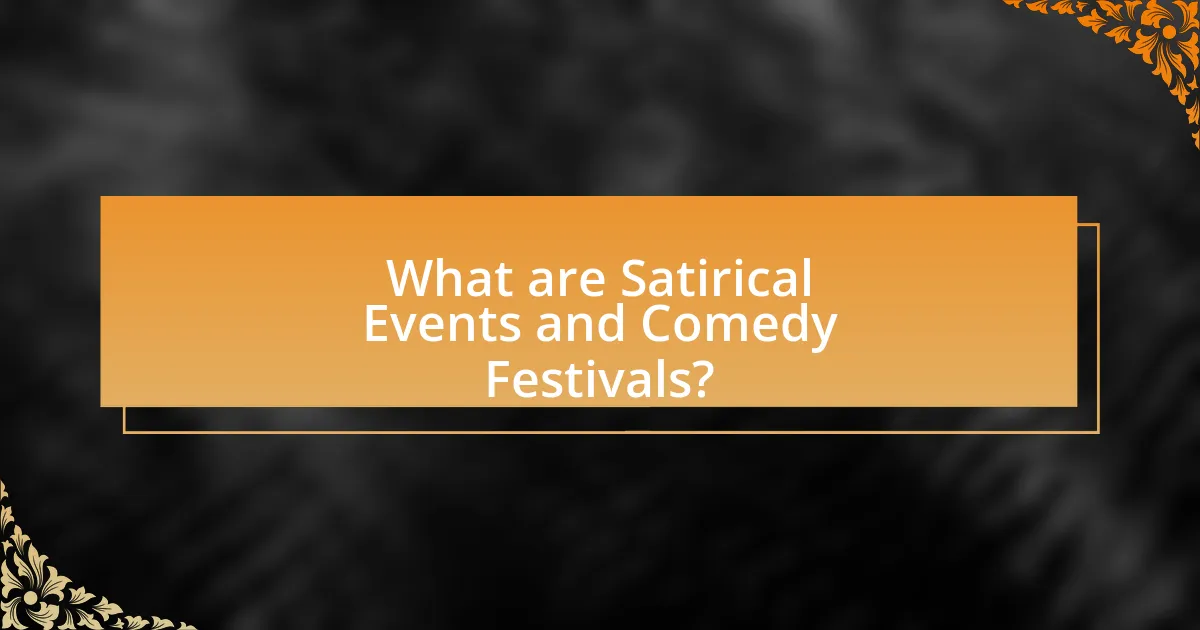
What are Satirical Events and Comedy Festivals?
Satirical events and comedy festivals are gatherings that focus on humor, often using satire to critique societal norms, politics, and culture. These events feature performances by comedians, satirists, and other entertainers who use comedic techniques to provoke thought and entertain audiences. For instance, the Edinburgh Festival Fringe, one of the largest comedy festivals in the world, showcases a wide range of comedic acts, including satirical performances that address contemporary issues. Such festivals not only provide a platform for emerging talent but also foster a community where humor serves as a tool for social commentary.
How do Satirical Events differ from traditional comedy shows?
Satirical events differ from traditional comedy shows primarily in their focus on social commentary and critique. While traditional comedy shows often prioritize entertainment through humor and storytelling, satirical events use humor as a tool to address and challenge societal issues, politics, and cultural norms. For instance, programs like “Saturday Night Live” and “The Daily Show” exemplify this approach by blending comedy with critical analysis of current events, thereby engaging audiences in a dialogue about important topics. This distinction highlights how satirical events aim not only to amuse but also to provoke thought and inspire change, setting them apart from conventional comedic performances that may not carry the same level of social relevance.
What elements define a Satirical Event?
A satirical event is defined by its use of humor, irony, and exaggeration to critique or mock societal norms, political issues, or cultural phenomena. These events often feature performances, skits, or presentations that highlight absurdities in real-life situations, encouraging audiences to reflect on serious topics through a comedic lens. For instance, events like the Onion’s “The Onion Comedy Festival” utilize satire to address current events, showcasing how humor can provoke thought and discussion about pressing issues.
Why are Comedy Festivals important for showcasing satire?
Comedy festivals are important for showcasing satire because they provide a dedicated platform for comedians to express and critique societal issues through humor. These events gather diverse comedic talent, allowing for a variety of satirical perspectives that can challenge norms and provoke thought among audiences. For instance, festivals like the Edinburgh Festival Fringe have historically featured performances that address political and social themes, enabling comedians to engage with current events in a way that resonates with the public. This environment fosters creativity and encourages dialogue, making satire accessible and relevant to a wider audience.
What role do Comedy Festivals play in the entertainment industry?
Comedy festivals serve as vital platforms for emerging and established comedians to showcase their talent, thereby influencing the entertainment industry significantly. These festivals facilitate networking opportunities, allowing comedians to connect with industry professionals, agents, and producers, which can lead to career advancements. For instance, events like the Edinburgh Festival Fringe, one of the largest arts festivals in the world, have historically launched the careers of numerous comedians, including Eddie Izzard and Billy Connolly. Additionally, comedy festivals contribute to the cultural landscape by promoting diverse voices and styles, enriching the comedic narrative within the entertainment sector.
How do Comedy Festivals promote emerging talent?
Comedy festivals promote emerging talent by providing a platform for new comedians to perform in front of diverse audiences and industry professionals. These festivals often feature open mic nights, showcases, and competitions specifically designed for up-and-coming comedians, allowing them to gain exposure and experience. For instance, festivals like the Edinburgh Festival Fringe and Just for Laughs have launched the careers of numerous successful comedians by offering them their first significant performance opportunities. Additionally, many festivals include workshops and networking events that connect emerging talent with established industry figures, further enhancing their chances of success in the comedy landscape.
What impact do Comedy Festivals have on audience engagement?
Comedy festivals significantly enhance audience engagement by creating immersive experiences that foster community interaction and emotional connection. These events provide a platform for diverse comedic talent, which attracts varied audiences and encourages participation through live performances, workshops, and social activities. Research indicates that festivals can increase audience retention and satisfaction; for example, a study by the University of Southern California found that 85% of attendees reported feeling more connected to the comedy community after participating in a festival. This engagement is further amplified by the shared laughter and collective enjoyment, which strengthens social bonds among attendees.
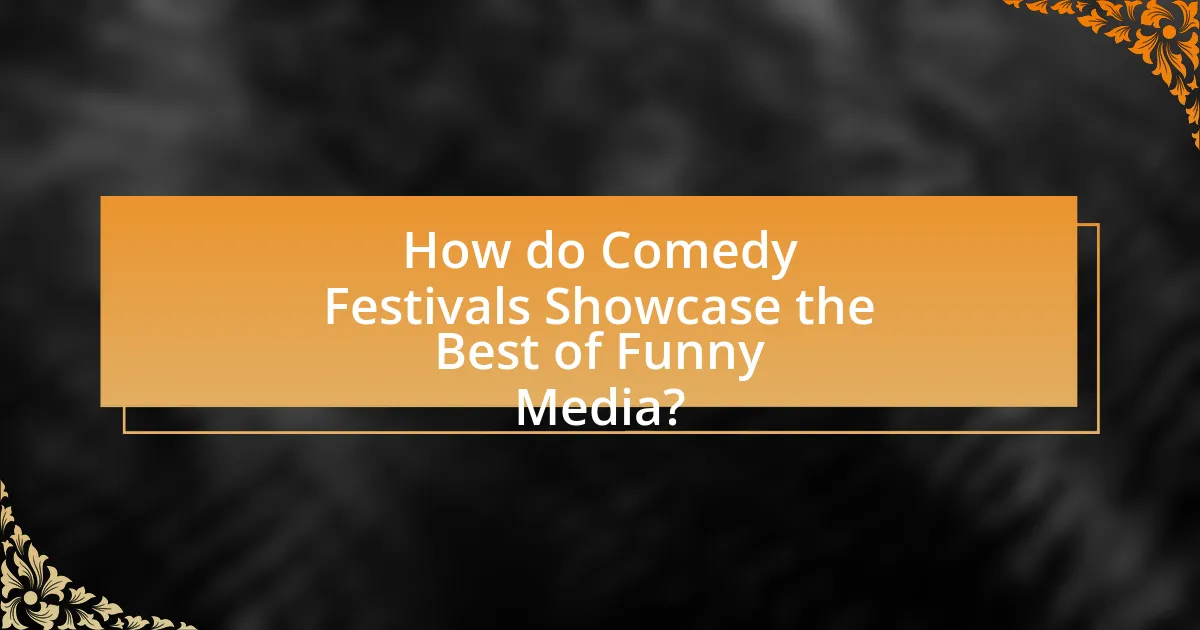
How do Comedy Festivals Showcase the Best of Funny Media?
Comedy festivals showcase the best of funny media by curating a diverse lineup of comedians, performances, and formats that highlight various comedic styles and cultural perspectives. These festivals often feature established and emerging talent, providing a platform for innovative material that resonates with audiences. For example, events like the Edinburgh Festival Fringe and Just for Laughs in Montreal attract thousands of performers and spectators, emphasizing the global nature of comedy. Additionally, comedy festivals often include competitions, workshops, and panels that foster collaboration and discussion among artists, further enriching the comedic landscape. This structured environment allows for the discovery of new comedic voices and the celebration of humor in its many forms, making comedy festivals essential in promoting and preserving the art of funny media.
What types of performances are featured at Comedy Festivals?
Comedy festivals feature a variety of performances, including stand-up comedy, improv shows, sketch comedy, and comedic theater. Stand-up comedy showcases individual comedians delivering monologues filled with humor, while improv shows involve unscripted performances based on audience suggestions. Sketch comedy consists of short, humorous scenes or vignettes, and comedic theater combines elements of drama and humor in a scripted format. These diverse performance types highlight the range of comedic talent and styles present at such festivals, attracting audiences with different tastes in humor.
How do stand-up, improv, and sketch comedy contribute to the festival experience?
Stand-up, improv, and sketch comedy significantly enhance the festival experience by providing diverse forms of entertainment that engage audiences through humor and spontaneity. Stand-up comedy offers a platform for comedians to share personal anecdotes and societal observations, creating a relatable atmosphere that fosters connection among festival-goers. Improv comedy, characterized by its unscripted nature, encourages audience participation and creates unique, unpredictable moments that heighten excitement and engagement. Sketch comedy presents short, scripted performances that often satirize cultural norms, allowing audiences to reflect on societal issues while enjoying laughter. Together, these comedic forms contribute to a vibrant festival atmosphere, promoting social interaction and shared experiences among attendees.
What role do guest speakers and panels play in Comedy Festivals?
Guest speakers and panels play a crucial role in Comedy Festivals by providing insights, fostering discussions, and enhancing the overall experience for attendees. These speakers, often industry professionals or renowned comedians, share their experiences and perspectives, which can educate audiences about the nuances of comedy and the entertainment industry. For instance, panels may cover topics such as the evolution of comedic styles or the impact of social media on comedy, allowing participants to engage in meaningful dialogue. This interaction not only enriches the festival atmosphere but also promotes networking opportunities among comedians, creators, and fans, thereby contributing to the growth and appreciation of comedic art forms.
How do Comedy Festivals curate their line-ups?
Comedy festivals curate their line-ups by selecting a diverse range of comedians based on factors such as popularity, performance style, and audience appeal. Organizers often review submissions, consider recommendations from industry professionals, and assess past performances to ensure a balanced representation of emerging and established talent. For instance, the Edinburgh Festival Fringe, one of the largest comedy festivals, utilizes a lottery system for new acts while also inviting well-known comedians to attract larger audiences. This approach not only enhances the festival’s reputation but also provides a platform for varied comedic voices, ensuring that attendees experience a wide array of humor styles.
What criteria are used to select performers for Comedy Festivals?
Comedy festivals select performers based on criteria such as originality, stage presence, audience engagement, and comedic style. Originality ensures that the material is fresh and unique, which is crucial for standing out in a competitive environment. Stage presence evaluates how well a performer captivates and holds the audience’s attention, while audience engagement measures the ability to connect with attendees, often through interactive elements. Comedic style is assessed to ensure a diverse range of humor that appeals to various audience demographics. These criteria are essential for curating a lineup that showcases the best talent and provides an enjoyable experience for festival-goers.
How does diversity in line-ups enhance the festival experience?
Diversity in line-ups enhances the festival experience by providing a broader range of perspectives and styles, which enriches audience engagement. When festivals feature a variety of performers from different backgrounds, they cater to diverse tastes and foster inclusivity, allowing attendees to connect with a wider array of comedic voices. Research indicates that diverse line-ups can lead to increased audience satisfaction, as seen in studies showing that events with varied acts attract larger crowds and generate more positive feedback. This variety not only entertains but also encourages dialogue and understanding among attendees, making the overall experience more memorable and impactful.
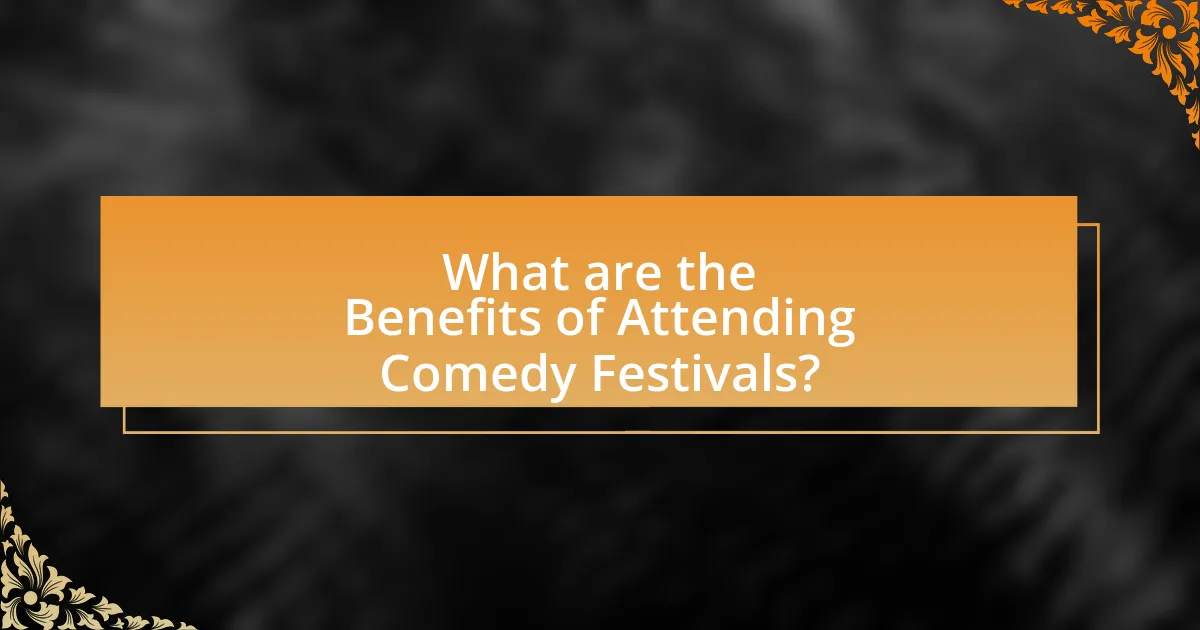
What are the Benefits of Attending Comedy Festivals?
Attending comedy festivals offers numerous benefits, including exposure to diverse comedic styles and the opportunity to experience live performances from various comedians. These festivals often feature a wide range of acts, allowing attendees to discover new talent and enjoy different forms of humor, from stand-up to improv. Additionally, comedy festivals foster a sense of community among attendees, creating an environment where laughter and shared experiences enhance social connections. Research indicates that laughter can improve mental health by reducing stress and increasing feelings of happiness, making comedy festivals not only entertaining but also beneficial for emotional well-being.
How do Comedy Festivals foster community and connection?
Comedy festivals foster community and connection by bringing together diverse audiences and performers in a shared space dedicated to humor. These events create an environment where individuals can bond over laughter, facilitating social interactions and shared experiences. For instance, festivals often feature local comedians alongside national acts, promoting local talent and encouraging community pride. Additionally, interactive workshops and open mic sessions allow attendees to engage directly with performers, further enhancing the sense of belonging. Research indicates that shared laughter can strengthen social bonds, making comedy festivals effective in building community ties.
What networking opportunities do Comedy Festivals provide for performers?
Comedy festivals provide performers with extensive networking opportunities, including connections with industry professionals, fellow comedians, and potential collaborators. These events often feature showcases, panels, and workshops where performers can interact directly with talent agents, producers, and festival organizers, facilitating relationships that can lead to future gigs or projects. Additionally, the informal atmosphere of comedy festivals encourages networking among peers, allowing comedians to share experiences, tips, and resources that can enhance their careers. The presence of diverse audiences also offers performers the chance to gain visibility and feedback, further expanding their professional network.
How do audiences benefit from the shared experience of live comedy?
Audiences benefit from the shared experience of live comedy by enhancing social connections and fostering a sense of community. When individuals attend a live comedy show together, they engage in collective laughter, which has been shown to release endorphins and create a bonding experience. Research indicates that shared laughter can strengthen interpersonal relationships, as it promotes feelings of belonging and reduces social anxiety. Furthermore, the immediacy of live performance allows audiences to react in real-time, creating a unique atmosphere that amplifies enjoyment and engagement. This communal experience not only entertains but also cultivates a shared cultural moment, reinforcing social ties among attendees.
What are the economic impacts of Comedy Festivals on local communities?
Comedy festivals significantly boost local economies by increasing tourism, generating revenue for local businesses, and creating job opportunities. For instance, a study on the Melbourne International Comedy Festival revealed that it contributes approximately $40 million annually to the local economy, attracting over 200,000 attendees. These festivals stimulate spending in hotels, restaurants, and retail shops, thereby enhancing overall economic activity. Additionally, they often lead to temporary employment for local staff in various sectors, further supporting community income.
How do Comedy Festivals contribute to local tourism?
Comedy festivals significantly contribute to local tourism by attracting large audiences, which boosts the local economy. These events draw both national and international visitors, leading to increased hotel bookings, restaurant patronage, and local transportation usage. For instance, the Edinburgh Festival Fringe, one of the largest comedy festivals, generates approximately £280 million for the local economy annually, showcasing how such festivals can have a substantial financial impact on host cities. Additionally, comedy festivals often promote local culture and talent, enhancing the destination’s appeal and encouraging repeat visits.
What are the financial benefits for local businesses during festivals?
Local businesses experience significant financial benefits during festivals, primarily through increased sales and customer traffic. Festivals attract large crowds, which directly boosts foot traffic to nearby shops and restaurants. For instance, a study by the National Endowment for the Arts found that local businesses can see sales increases of 30% to 50% during major events. Additionally, festivals often lead to heightened visibility for local brands, enhancing their market presence and customer loyalty. This influx of visitors not only generates immediate revenue but also fosters long-term relationships with new customers, contributing to sustained economic growth for local enterprises.
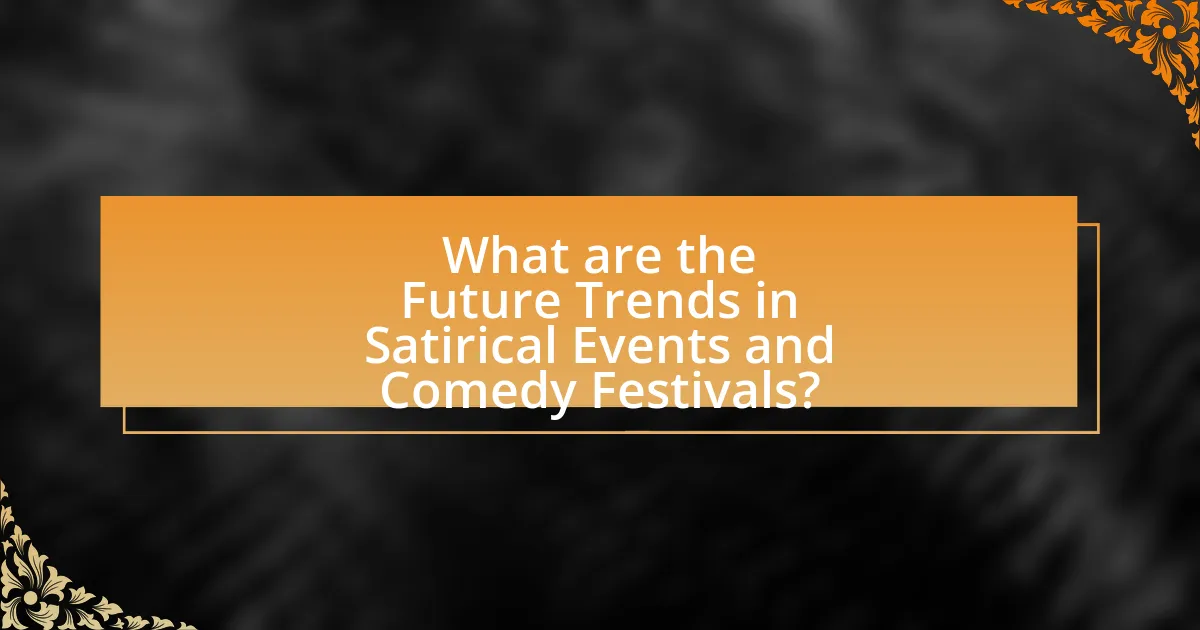
What are the Future Trends in Satirical Events and Comedy Festivals?
Future trends in satirical events and comedy festivals include increased integration of digital platforms, a focus on social issues, and the rise of diverse voices in comedy. Digital platforms allow for broader audience reach and engagement, as seen with virtual comedy festivals gaining popularity during the COVID-19 pandemic, which expanded access to global audiences. Additionally, comedy festivals are increasingly addressing pressing social issues, reflecting societal changes and resonating with audiences seeking relevant content. The inclusion of diverse voices is also on the rise, with festivals showcasing underrepresented comedians, which enhances the richness of comedic perspectives and fosters inclusivity. These trends indicate a shift towards more interactive, socially conscious, and diverse comedic expressions in the future.
How is technology influencing the format of Comedy Festivals?
Technology is significantly influencing the format of comedy festivals by enabling hybrid models that combine in-person and virtual experiences. This shift allows festivals to reach a broader audience, as seen in events like the Edinburgh Festival Fringe, which adopted online streaming options during the pandemic, resulting in a 30% increase in global viewership. Additionally, social media platforms facilitate real-time audience engagement and feedback, enhancing the interactive experience for both performers and attendees. The integration of advanced ticketing systems and mobile apps streamlines access and enhances user experience, further modernizing the festival format.
What role do virtual and hybrid events play in the future of comedy?
Virtual and hybrid events are essential for the future of comedy as they expand audience reach and accessibility. These formats allow comedians to perform for global audiences without geographical limitations, significantly increasing potential viewership. For instance, during the COVID-19 pandemic, platforms like Zoom and social media enabled comedians to connect with fans worldwide, leading to a surge in online comedy shows. According to a report by Eventbrite, 70% of event organizers plan to continue offering virtual or hybrid options post-pandemic, indicating a lasting shift in how comedy is consumed. This evolution not only democratizes access to comedy but also fosters diverse comedic voices that might not have been heard in traditional settings.
How are social media platforms shaping audience engagement at festivals?
Social media platforms are significantly shaping audience engagement at festivals by facilitating real-time interaction and content sharing among attendees. These platforms enable festival-goers to share their experiences instantly through posts, photos, and videos, which enhances community building and fosters a sense of belonging. For instance, during major events like the Edinburgh Festival Fringe, social media analytics show that user-generated content can increase event visibility and attract larger audiences, with hashtags trending globally. Additionally, live streaming features on platforms like Instagram and Facebook allow audiences unable to attend in person to engage with the festival remotely, further expanding the reach and impact of the event.
What can attendees expect from the evolution of Comedy Festivals?
Attendees can expect a more diverse range of comedic styles and formats from the evolution of Comedy Festivals. As these festivals adapt to changing audience preferences, they increasingly feature a mix of stand-up, improv, sketch, and digital content, reflecting the broader landscape of comedy. For instance, festivals like the Edinburgh Festival Fringe have expanded their programming to include international acts and multimedia performances, showcasing a variety of comedic voices and perspectives. This evolution not only enhances the entertainment value but also fosters inclusivity and innovation within the comedy community.
How might themes and topics of satire change in response to societal trends?
Themes and topics of satire change in response to societal trends by reflecting current events, cultural shifts, and public sentiments. For instance, during periods of political upheaval, satire often targets government actions and policies, as seen in the rise of political satire during the Watergate scandal in the 1970s. Similarly, social movements, such as the #MeToo movement, have influenced satirical content to address issues of gender equality and sexual harassment, showcasing how satire adapts to highlight pressing societal concerns. This responsiveness ensures that satire remains relevant and resonates with audiences, effectively critiquing and commenting on the evolving landscape of societal norms and issues.
What innovations can enhance the festival experience for audiences?
Innovations that can enhance the festival experience for audiences include the integration of augmented reality (AR) and virtual reality (VR) technologies. These technologies allow attendees to engage with performances in immersive ways, such as experiencing a comedy show from multiple perspectives or interacting with virtual characters. For instance, a study by the University of Southern California found that AR can increase audience engagement by 30%, making performances more memorable. Additionally, mobile apps that provide real-time feedback and personalized schedules can streamline the festival experience, ensuring that audiences do not miss their favorite acts.
What are some tips for maximizing your experience at Comedy Festivals?
To maximize your experience at comedy festivals, prioritize planning your schedule in advance. Research the lineup of performers and shows to identify your favorites, as many festivals feature multiple acts simultaneously. Arriving early allows you to secure good seating and enjoy pre-show activities, enhancing your overall experience. Engaging with fellow attendees can also enrich your visit, as sharing insights and recommendations fosters a sense of community. Additionally, consider attending workshops or panels if available, as they provide deeper insights into the comedy industry and the creative process behind performances.
How can attendees plan their schedules effectively?
Attendees can plan their schedules effectively by prioritizing events based on personal interests and the festival’s schedule. By reviewing the lineup in advance, attendees can identify key performances, workshops, and panels that align with their comedic preferences. Additionally, utilizing tools such as mobile apps or printed schedules provided by the festival can help in organizing time slots and avoiding conflicts. Research indicates that attendees who create a structured plan are more likely to maximize their experience, as they can allocate time for networking and relaxation between events, ensuring a balanced and enjoyable festival experience.
What should first-time attendees know before going to a Comedy Festival?
First-time attendees should know that planning ahead is crucial for a successful experience at a Comedy Festival. This includes researching the lineup of comedians, understanding the schedule of performances, and purchasing tickets in advance, as many popular shows sell out quickly. Additionally, attendees should be aware of the venue layout and amenities, such as food and drink options, to enhance their comfort during the event. According to a survey by the National Endowment for the Arts, 70% of festival-goers reported that prior knowledge of the event significantly improved their enjoyment.
